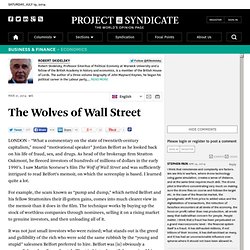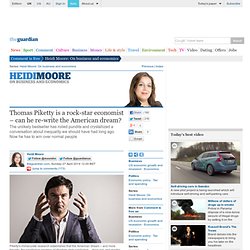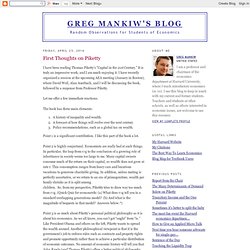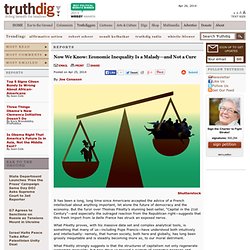

Piketty Blitz [Scoop.it]
[Critical of Piketty] Robert Skidelsky explores the financial ecosystem that produced Jordan Belfort. Exit from comment view mode.

Click to hide this space LONDON – “What a commentary on the state of twentieth-century capitalism,” mused “motivational speaker” Jordan Belfort as he looked back on his life of fraud, sex, and drugs. As head of the brokerage firm Stratton Oakmont, he fleeced investors of hundreds of millions of dollars in the early 1990’s. Book review: Robert Skidelsky on Capital in the 21st Century by Thomas Piketty. Over 1,000 people lie down on a San Francisco beach to spell out “TAX THE 1%” ©2011 John Montgomery The early 19th-century founders of the classical school of economics reasoned that the distribution of a society’s income depended crucially on who owned its productive resources.

David Ricardo identified three classes of producer, landlords, capitalists and workers. Each of these classes owned a factor of production—land, capital and labour. With land and capital scarce relative to labour, landlords and capitalists could claim a disproportionate share of the produce that they and the workers jointly produced. Workers’ pay would be forced to subsistence. BrankoMilan: Piketty-related arguments: ... Ten questions for Thomas Piketty, the economist who exposed capitalism’s fatal flaw. Thomas Piketty is in high demand.

The 42-year old French economist’s new book Capital in the Twenty-First Century offers a nerve-wracking argument: Because the return on investment tends to exceed the rate of growth, inequality isn’t an unintended consequence but an inevitable part of capitalism, and higher taxes on wealth are required to protect democratic society. Promoting the book in Washington, DC, he was mobbed at the International Monetary Fund, hobnobbed with president Barack Obama’s advisors and spoke at a panel that included economics Nobelist Robert Solow; in New York, he spoke at the Council on Foreign Relations and the United Nations.
He also found time to sit down with Quartz. Piketty for Ghosts of Tom Joad Readers. First Dog on the Moon explains the reaction to Thomas Piketty's new book – cartoon. Even Billionaires Love This Guy's Book About Inequality - The Market Now. Thomas Piketty's Capital: everything you need to know about the surprise bestseller. That capitalism is unfair has been said before.

But it is the way Thomas Piketty says it – subtly but with relentless logic – that has sent rightwing economics into a frenzy, both here and in the US. His book, Capital in the Twenty-first Century, has shot to the top of the Amazon bestseller list. Carrying it under your arm has, in certain latitudes of Manhattan, become the newest tool for making a social connection among young progressives. Meanwhile, he is been condemned as neo-Marxist by rightwing commentators. Thomas Piketty.
Book Review: 'Capital in the Twenty-First Century' by Thomas Piketty. Piketty’s Triumph. In the 1990s, two young French economists then affiliated with the Massachusetts Institute of Technology, Thomas Piketty and Emmanuel Saez, began the first rigorous effort to gather facts on income inequality in developed countries going back decades. In the wake of the 2007 financial crash, fundamental questions about the economy that had long been ignored again garnered attention. Piketty and Saez’s research stood ready with data showing that elites in developed countries had, in recent years, grown far wealthier relative to the general population than most economists had suspected. By the past decade, according to Piketty and Saez, inequality had returned to levels nearing those of the early 20th century. Thomas Piketty is a rock-star economist. Can he re-write the American dream? When the movie is made about the fall of Western capitalism, Thomas Piketty will be played by Colin Firth.

Piketty, whom the Financial Times called a "rock-star economist", isn't a household name – but he should be, and he has a better shot than any other economist. He is the author and researcher behind a 700-page economic manifesto, titled Capital in the 21st Century, that details the path of income inequality over several hundred years. This sublime nerdishness is, somehow, a huge hit. It is now No 1 on Amazon's bestseller list and sold out in many bookstores. When Piketty spoke on a panel this month at New York's CUNY with three other economists – two of them Nobel-prize winners, Joseph Stiglitz and Paul Krugman – the Frenchman was the headliner. Pourquoi le livre de Piketty est-il un succès aux Etats-Unis ? Le Monde.fr | • Mis à jour le | Par Mathilde Damgé Le livre du Français Thomas Piketty Le Capital au XXIe siècle (Editions du Seuil, 2013) se classait encore, jeudi 24 avril, en tête des ventes aux Etats-Unis sur le site de distribution en ligne Amazon.

Publié l'an dernier en France (lire des extraits sur le site du Seuil), il n'est arrivé que cette année aux Etats-Unis. Mais l'énorme succès rencontré outre-Atlantique par un ouvrage pourtant austère, écrit par un économiste qu'on classe, en France, plutôt à gauche, ne cesse d'étonner. Le triomphe américain d’un économiste français. La publication en anglais par Harvard university press du dernier livre de l’économiste Thomas Piketty fait événement.

Le petit livre rouge de la révolution fiscale. Piketty à Hollande: davantage d'audace! Stiglitz Krugman Conference Capital in the 21 Century. Piketty & Todd - Le capital au XXIe siècle. Richesses et croissance : les tromperies statistiques de Thomas Piketty. IREF - Institut de Recherches Économiques et Fiscales « Pour la liberté économique et la concurrence fiscale » 1) La croissance infinie des gros patrimoines ou les limites des mathématiques Son postulat est que l’accroissement inéluctable des écarts de richesse est dû à l’inégalité fondamentale qu’il note r > g où r désigne le rendement du capital (c’est-à-dire ce que rapporte le capital en moyenne au cours d’une année, sous forme de profits, dividendes, intérêts, loyers…, en pourcentage de sa valeur) et où g représente le taux de croissance (c’est-à-dire l’accroissement annuel du revenu et de la production).

Il considère ainsi que l’hyper concentration patrimoniale observée dans les sociétés agraires et traditionnelles, en particulier jusqu’à la première guerre mondiale en Europe, « est liée au fait qu’il s’agit d’économies caractérisées par une faible croissance, et par un taux de rendement du capital nettement et durablement supérieur au taux de croissance…. First Thoughts on Piketty. I have been reading Thomas Piketty's "Capital in the 21st Century.

" It is truly an impressive work, and I am much enjoying it. I have recently organized a session at the upcoming AEA meeting (January in Boston), where David Weil, Alan Auerbach, and I will be discussing the book, followed by a response from Professor Piketty. Let me offer a few immediate reactions. The book has three main elements: A history of inequality and wealth. Point 2 is highly conjectural. M.truthdig. Now We Know: Economic Inequality Is a Malady—and Not a Cure Posted on Apr 25, 2014 By Joe Conason It has been a long, long time since Americans accepted the advice of a French intellectual about anything important, let alone the future of democracy and the economy.

Poulos Gets Piketty—and Tocqueville—Wrong. He might be 80, but former lieutenant governor Richard Ravitch, out with a new memoir, has the same gleam in his eye—and he’s still warning of crises. Andrew Cuomo, call your office. The man who rescue helped rescue New York City from bankruptcy in the 1970s says New York is in deep financial trouble again. And this time, it’s the whole state that’s in deep. Dick Ravitch, the longtime New York power broker and financial guru, can smell it when smiling politicians proclaim their governments’ budgets fully balanced. He’s been calling them out for years—but often finds his warnings unheeded. The 1-Star Amazon Reviews Of Thomas Piketty's Book Are Pretty Funny. Thomas Piketty seems to have stirred up a new Red Scare. His new book, Capital in the Twenty-First Century, is being hailed as the most important book of the decade, even the century.
The French economist’s 696-page tome is sold out on Amazon, where it’s the No. 1 bestseller. Backed by centuries of data, Piketty posits that unregulated capitalism naturally widens the wealth gap between rich and poor, and will continue to do so. Returns on capital, such as real estate or stocks, grow faster than the larger economy, so the wealthy accumulate more wealth over time while the working classes divvy up a shrinking share of the pie. "This is the central reason why we had so much wealth concentration in the past," Piketty told HuffPost Live last week. Needless to say, conservatives are panicking, looking for any way to refute Piketty’s work. “Good luck with that,” New York Times columnist Paul Krugman wrote on Thursday. Piketty and Pareto. Well, it’s Piketty day at the Times, with David Brooks and yours truly even having more or less matching headlines. And David’s take reminds me of something I’ve been meaning to do: explain one important point in Piketty that even economist readers have, it seems, tended to miss.
In his critique David says of Piketty, He predicts that family fortunes will concentrate, though big ones in the past have tended to dissipate and families like the Gateses give a lot away. So, two points. Thomas Piketty doesn’t hate capitalism: He just wants to fix it. Thomas Piketty - capital21cen. Thomas Piketty ENS page FR - capital21c. The Piketty Panic. “Capital in the Twenty-First Century,” the new book by the French economist Thomas Piketty, is a bona fide phenomenon. Other books on economics have been best sellers, but Mr. Piketty’s contribution is serious, discourse-changing scholarship in a way most best sellers aren’t.
And conservatives are terrified. Thus James Pethokoukis of the American Enterprise Institute warns in National Review that Mr. Piketty’s work must be refuted, because otherwise it “will spread among the clerisy and reshape the political economic landscape on which all future policy battles will be waged.” Well, good luck with that. The Piketty Phenomenon. Many people join the political left driven by a concern for the poor. But, over the past several years, the Democratic Party has talked much more about the middle class than the poor. Meanwhile, progressive political movements like Occupy Wall Street directed their fervor at the top 1 percent. Progressive movies and books have focused their attention on conspiracy and oligarchy at the top, not “Grapes of Wrath” or “How the Other Half Lives” stories at the bottom. This is natural. Piketty's 'Capital' Is Sold Out, Harvard Press Scrambling. Until this month, Harvard University Press had achieved two notable sales successes in the past 15 years.
Stephen Jay Gould’s Dinosaurs in a Haystack: Reflections on Natural History and Charles Taylor’s A Secular Age both sold around 60,000 copies in each one’s first year, making them blockbusters by HUP’s scholarly standards. By contrast, Thomas Piketty’s Capital in the Twenty-First Century has already sold around 80,000 copies in less than two months, and is currently sold out. According to Susan Donnelly, sales and marketing director at the 101-year-old house, that figure does not include an estimated 12,000 e-books sold (which Amazon is wisely peddling for a stratospheric $21.99), nor the 80,000 copies HUP is in the process of printing or the 35,000 it guesses it will print in the very near future.
Do the math, and suddenly you are north of 200,000 books that the house expects to sell in a few months. Rock star treatment > Thomas Piketty Tours US for His New Book. French economists who boldly question the dominance of capital over labor — and call for a progressive global tax on wealth — visit the American halls of power about as often as French rock stars headline Madison Square Garden. But those halls of power are where Thomas Piketty, a 42-year-old professor at the Paris School of Economics, has been singing his song of late. Piketty’s Wealth Gap Wake Up.
On Gattopardo Economics - NYTimes.com - NYTimes. The Hourly Piketty: Paul Krugman, "Gattopardo Economics", and Economic Modelling. *Paul Krugman: On Gattopardo Economics: “Thomas Palley… raises an interesting point… …disappointed that Piketty’s book relies mainly on conventional, mainstream economics… labor and capital… paid their marginal product… True, when discussing the rise of “supermanagers” Piketty talks about imperfect competition and rents, but that’s not the core of his work….
Palley and others are disappointed…. The thing to bear in mind, however, is that you really don’t need to reject standard economics either to explain high inequality or to consider it a bad thing…. You can be perfectly conventional in your economics–or, my own attitude and what I think is Piketty’s, willing to use conventional models when they’re convenient and seem useful without treating them as irrefutable truth–while still taking inequality very seriously. Thomas Piketty and Millennial Marxists on the Scourge of Inequality.
The Power of Piketty’s ‘Capital’ A brilliant book has named the problem of our time. But will anything change? Thomas Palley » Blog Archive » The accidental controversialist: deeper reflections on Thomas Piketty’s “Capital” Thomas Piketty’s Capital in the Twenty-First Century is a six hundred and eighty-five page tome that definitively characterizes the empirical pattern of income and wealth inequality in capitalist economies over the past two hundred and fifty years, and especially over the last one hundred. It also documents the grotesque rise of inequality over the past forty years and ends with a call for restoration of high marginal income tax rates and a global wealth tax. His book has tapped a nerve and become a phenomenon. In laying a solid blow against inequality, Piketty has also become an accidental controversialist.
That is because his book has potential to unintentionally trigger debate over so-called “free market” capitalism. Why do some economists say the increase in inequality has been overstated? - Everything you need to know about income inequality. The Piketty Chronicles. Piketty superstar : Hollande l’a ignoré, l’Amérique l’a adoubé. Thomas Piketty à l’Economic Policy Institute à Washington DC, le 15 avril 2014 (IVAN COURONNE/AFP) Le Français Thomas Piketty, nouvelle star mondiale de l’économie ?
Reçu à la Maison Blanche cette semaine par les conseillers d’Obama, puis par le secrétaire américain au Trésor. Thomas-piketty-tours-us-for-his-new-book. Is inequality the cause of capitalist crises? This Is Brad DeLong's Grasping Reality...: Over at the WCEG/EPI: Thomas Piketty: Wealth, Income and Inequality: Tuesday Focus: April 15, 2014. The rise and fall and rise again of inequality: an interview with Thomas Piketty. Capitalism simply isn't working and here are the reasons why.
Piketty and the distribution of wealth - Sunday Extra. Why We’re in a New Gilded Age by Paul Krugman. Some Follow-Up Notes on Thomas Piketty's "Capital in the 21st Century" Not born rich? Out of luck. Kapital for the Twenty-First Century? The short guide to Capital in the 21st Century. Overcoming America's Debt Overhang: The Case for Inflation. Newrepublic. Ten questions for Thomas Piketty, the economist who exposed capitalism’s fatal flaw.